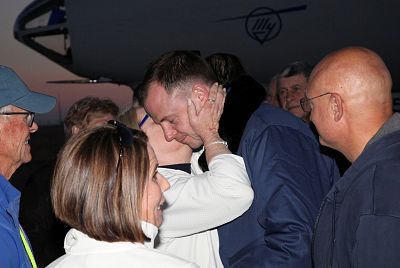"Training really takes over … training for every scenario that they can think of and this is one of those," said Hague.
American astronaut Nick Hague — days after he was forced to make an emergency, ballistic descent— said Tuesday he didn't have any time to panic as his journey went haywire and could have ended in tragedy.Hague told NBC News that as soon as warning lights alerted he and Russian cosmonaut Alexey Ovchinin to abort on Thursday, their minds automatically went to a checklist of life-or-death tasks."Training really takes over … training for every scenario that they can think of and this is one of those," said Hague."And you realize the thing you can do to help yourself the most it to stay calm and execute the procedures as a team."It was supposed to be Hague's first voyage to space, as he and Ovchinin were trying to reach the International Space Station atop a Soyuz booster rocket."I imagined that my first trip to outer space was going to be a memorable one," he said. "I didn't expect it to be quite this memorable."He gave all credit to his flight partner, who led the way once they learned of the booster failure and guided them to the successful hard landing in the Kazakh countryside.
Science
"So I have to give kudos to my commander Alexey Ovchinin. He's a seasoned, veteran cosmonaut. As we were going through all of this, he was able to tell me what's normal, what's not normal," Hague said.While navigating their capsule back to earth, Hague kept his eyes glued to the window, hoping for a safe landing."Were we going end up landing on water? Were we going to be on the Steppes of Kazakhstan?" he said. "Luckily for us, it was smooth flat terrain. It worked out as a pretty smooth landing."
Once Hague was back on earth, he was plagued by one last technological failure — in the form of voicemail.The 43-year-old Air Force veteran used a satellite phone to call his wife, but she didn't pick up."It went to voicemail so now she's got a voicemail she can keep as a memento for the rest of her life," he laughed. "I told her I was fine and it was one wild ride."Despite this failed trip, Hague said he's looking forward to blasting off again: "Absolutely, I'm ready to fly."












